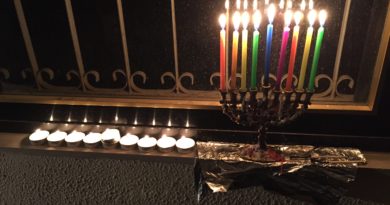Vayeshev 5773 — A Tale of Envy
This week’s parsha contains a tale of envy between brothers. Yes, Joseph was an arrogant little guy, with his not only having dreams of his family bowing down to him, but sharing them. But the brother’s also had a great deal of envy toward their younger brother. Joseph was clearly their father’s favorite. The child of his old age. He gave Joseph a special colorful coat as a sign of his affection.
How did Joseph’s brother’s deal with their envy? They said “Let’s kill the little brat!”
It is well known that envy will drive people to murder. This isn’t even the first example we have in the Torah. The very first case of one person doing something violent to another person, the story of Cain and Abel, is a story driven by envy. Cain envied the way that God accepted Abel’s offering. His envy of Abel’s favored position with God led him to murder his brother.
And this is not the last example envy leading to murder, or attempted murder, in the Hebrew Bible. When Saul and David came back from military campaigns, the crowds cheered Saul’s thousands (of enemies he killed) and David’s ten thousands. Saul envied the crowd’s admiration of David, and decided that David had to go—he would not tolerate competition for the affections of the people.
Of course, sometimes our actions have very unforeseen and unintended consequences. Joseph’s being sold in slavery is in a sense the real beginning of the Passover story. If Joseph had not been sold into slavery because of the envy of his brothers, the family would probably not have ended up moving to Egypt—and would not have been enslaved, which led to the eventual redemption we celebrate at Passover.
Just as the Passover story has it’s roots in brotherly envy, the Chanuka story also has its roots in brotherly envy.
When we tell the story of Chanuka to our friends or children, we usually start the story with the wicked king Antiochus IV, who passed evil decrees against the Jews in the days Judah Maccabee. In the al hanisim prayer we recite in the Amidah and birkat hamazon this week, we recall the miracle by starting with the wicked decrees. The part of the story that is not as often told is WHY did Antiochus IV decide to issue those evil decrees?
The second temple period, which began with the rebuilding of the Temple late in the 6th century BCE after the first exile, was a difficult time for the Jews…during much of the time Israel was a sort of vassal state, under foreign domination—Babylonian, Persian, Greek, Ptolemaic. In the early part of the 2nd century BCE Israel was under the dominance of the Seleucid dynasty, one of the successors to the conquests of Alexander the great in the 4th century BCE. The office of high priest was commonly sold off by the powers in Syria, the Seleucid capitol, to the highest bidder, as opposed to going to whoever was most worthy.
Interestingly to find the details of what led up to Chanuka story we have to turn to a text that is considered part of the Apocrypha by Jews, but which is part of Christian scripture. The book of Maccabees, in particular II Maccabees.
Onias was the high priest, ”the favorite” so to speak, just as Joseph was the favorite in his day. His brother Jason envied Onias’s position—just as Joseph’s brothers envied Joseph’s favored position in the household. Jason also envied the wealth and prestige that came with the office of high priest…so he usurped his brother and took over the position of high priest. Jason’s friend Menelaus also coveted this plum position, and when Jason sent him on a mission to the king, Antiochus, he outbid his friend and was able to take over the high priest’s office (with friends like that…). Once Menelaus was in office however, his greed led him to do something foolish—not pay the king what he had promised. When the king was off attending to some other business, Menelaus sent some gold he stripped from the Temple to the regent that had been left in charge, no doubt hoping to curry favor. Onias heard about this, and saw an opportunity: he denounced Menelaus (no doubt as part of a scheme to win back the lucrative high priesthood for himself). Menelaus approached the regent, Andronicus, and urged him to have Onias killed. Andronicus went along with this scheme. When the king got home, he found a petition from the Jews of Antioch protesting the murder of Onias. The king liked Onias, and was so upset he had Andronicus executed on the same spot that he had murdered Onias.
Menelaus’ greed truly knew no limits. He somehow managed to avoid being mixed in with Andronicus’ murder of Onias—but instead of keeping a low profile, he brings in a friend to help plunder more of the Temple’s gold. The Jews got so upset they succeeded in revolting and killing Menelaus’ crony. Menelaus was accused in the incident, but once again he managed to avoid harm by bribing a courtier, who convinced the king to let Menelaus off the hook. Taking revenge, Menelaus had the people who charged him executed.
Though his despicable actions, Menelaus had made himself very unpopular with the people. Jason saw an opportunity to win back the high priesthood for himself…by force. He put together a small army, and when he heard a rumor (false it turns out) that the king had been killed in battle he moved into action, storming Jerusalem with his small force. Jason and his troops killed many of their fellow Jews in their attempt to take the city…which did not quite succeed. Jason ended up having to flee, after accomplishing nothing but massacring a bunch of Jews.
Meanwhile, the king, Antiochus, heard of what was going on in Jerusalem, and came to the conclusion that it was an insurrection against his rule. This insurrection—which was driven by nothing noble, just greed and envy—is what directly led Antiochus to take action. He sent his army to Jerusalem, killed 80,000 Jews, plundered and defiled the Temple, and outlawed Jewish practices.
This was what got Judas Maccabee – “the hammer”–incensed. It was bad enough in the days when the high priesthood was corrupt; at least the temple rituals were still being followed, and people could practice their religion. But when they were forbidden to keep the Sabbath, or observe the festivals, or circumcise their sons, or even admit to being Jewish—this was too much, and the Maccabees rose up, winning the eventual victory that we celebrate on Chanuka.
Just as the real roots of the Passover story go back to envy between brothers—as we read about in this week’s parsha—the real roots of the Chanuka story go back to envy between brothers and friends.
The Torah cautions us against envy—in fact coveting, the extreme form of envy—is forbidden in the ten commandments. Proverbs 14:30 warns against the effects of envy: A sound heart is the life of the flesh; but envy is the rottenness of the bones.
Rabbi David Altschuler, the 18th century Galacian exegete (Metzudat David) explains this verse by telling us that someone who has a sound heart will be protected against envy, and this will be the life of his flesh because he’s not going to be worried and consumed with how to get revenge on others; but someone who has a hard heart, and hangs on to envy, will bring rottenness to himself from the continual stress and worry.
Ibn Ezra tells us that envy will lead you to do bad things—which is the rottenness of the bones, it will lead you to become a “rotten person.”
Most of us are not so driven by envy that it leads us to murder… BUT envy still can lead to great discontent, to immoral actions, to a “rottenness of the bones,” in anyone.
What is envy? It is a state of discontent. Sandra Kurtzig, an entrepreneur who founded ASK software, one of the early programs used to run factories, said “someone who has say $10 million is not necessarily happier than someone who has $9 million.” Those of us who are a long way from $9 million laugh at that, but sadly, for people with $9 million it can be a very real problem. Just like you might envy your neighbor’s ski vacation in Europe when you can only afford Whistler, a person with an 80 foot yacht could feel content until he gets on his friend’s 100 foot yacht and suddenly his feels cramped and he envies his friend’s. There is no amount of wealth that is enough to protect you from feeling envy.
Our tradition tells us the way out of this quandary. In Pirkei Avot, the Ethics of our Fathers, it is taught: “Who is rich? He who rejoices in his lot, as it is said, “When you eat of the labor of your hands, you shall be happy, and it shall be well with you. You shall be happy – in this world, and it shall be well with you – in the world to come.”
Great advice, but how do we do that, how do we develop that feeling of contentment with our lot?
The answer brings us back to Chanuka – a celebration of rededication to Yiddishkeit. The holiday commemorates not the military victory—it’s not called “netzach,” which would mean “victory”—rather it celebrates the chanuka, the rededication of the Temple. It celebrates the ability to do mitzvot. Remember that our purpose in life is to serve God, not accumulate wealth – and it won’t matter so much whether you have $10 million, or only $9 million…


